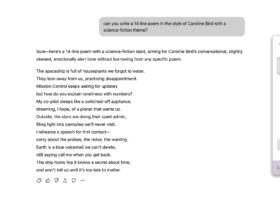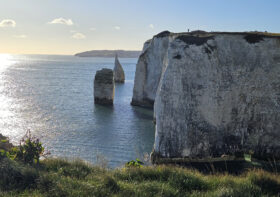From first draft to publication
Something of an experiment today. I love seeing those handwritten drafts of famous poems, with the crossings out and alterations, such as this version of Wilfred Owen’s ‘Dulce et Decorum est’ at the British Library. I think it’s fascinating to see how people work on poems, and in workshops I often wonder how a particular piece is going to change, and why.
We don’t often get to see the full journey of a poem, so I thought I’d have a bit of fun with the idea and take one of mine to show how and why it changed, what happened when I workshopped it. It’s one that eventually won The New Writer competition and was published in their anthology edition this summer, in other words, ‘finished’ in one sense of the word (if poems are ever finished?) Warning: this is a long post.
Here’s the first draft (13-10-12):
Waiting for the bus
He cuts the engine at eleven twenty,
leaves the radio going, eighties pop.
Turning, I cup hands to my temples,
press them to the window, strain
to make visual sense of the black
outside. The driver sits back, lights up.
A few people look about to leave.
Heads slouched in sleep lift expectantly,
backpacks are pulled down from racks
Someone fills the aisle with his body.
Thigh brushing my knee, he murmurs
an apology. Next to me, Terry’s hand
on the headrest in front, taps along
to the Annie Lennox song that’s playing.
Let’s get out, he says, so we do, but
at the roadside I lose sight of my feet
and with them my confidence. Terry’s arm
is outstretched, pointing at a star
low on the horizon, adrift from Orion,
faint at first but stronger with each blink,
a desert lighthouse. It’s coming, he says.
From the minibus, a shout. Figures move
around inside, fetching their things.
Relax, I hear the driver say, not yet,
it’s at least twenty minutes away.
So we watch as the dot grows fat, splits
into four, ploughing the highway, thirty
miles in its own time, kicking up red dust.
I wonder at what point we are visible:
Giralia turn off, junction with Burkett Road,
midnight pickup, nowhere for a drink,
the drivers greeting each other, a dirty laugh,
radio patter in the background, Eternal Flame.
There were some things I liked about this – the radio playing in the background was important and I thought the detail of the eighties pop (Annie Lennox, Eternal Flame) were good. I wanted to get across the sheer blackness of the night, the emptiness of the landscape, the boredom of waiting. The key thing is the idea of the bus approaching from so far away that although its headlights are visible, it still takes ages to arrive. The loneliness, the sense of being utterly out of place.
But – although you could say there was too much ‘telling the story’ and ‘he says… he says’ I decided to go further down that route, make it richer, go into ‘overdrive’ mode which for me usually means the lines get longer and sentences denser. Should the sparseness of the landscape make the details stand out more? Would more detail of the inside of the bus throw the emptiness of the landscape into sharper relief?
The next complete draft was five stanzas of 8 lines. (Did I have a competition in mind??) Much of it was unchanged, but with some detail added:
…
A man fills the aisle with his body,
starts talking loudly in bent vowels.
Ocker – this from Terry, his hand
on the chrome bar of the seatback,
tapping to an Annie Lennox song.
(from draft 3, 16-10-12)
The title had changed to ‘Leave no trace’, a phrase which appears in the third stanza. The original, ‘Waiting for the bus’ just sounded so pedestrian to me, especially as the bus is so clearly depicted. Need something more intriguing!
I wasn’t happy with the heavy blocks of lines, the look of it. So the next complete version was in quatrains, six stanzas, but much longer lines. I renamed it again, to ‘Midnight pickup, junction with Burkett Road’ and took it to a workshop with Mimi Khalvati and a group of excellent poets.
The comments I got were that there was too much telling of the story, that the ideas ‘peek through’ in some places but the heavy narrative was obscuring it. I’d altered the last stanza and wanted to end with the ‘swapping’ of the passengers getting off with those getting on, but in the course of so doing had introduced another, confusing theme:
…
I wonder at what point we are visible, Giralia turn off, midnight pickup.
The twice weekly ritual of hard grind across desert, stopping here
where there are no signs, for the swapping of human cargo, this thought
as we climb on, as behind us the radio fades to black: Eternal Flame. (d5, 20-10-13)
“Is it about human trafficking?” someone wanted to know, and suddenly images of a war torn landscape and body bags were interfering. Clearly the ‘human cargo’ bit was misleading. Mimi’s advice was to listen. Where’s the poetry? Cut the cord between what actually happened (if indeed it did) and what the poem wants to be about. “Tension between two elements is good but conflict isn’t.” She singled out the two middle stanzas as being ‘where the poetry lay’:
At the roadside I lose sight of my feet and with them my confidence.
Am I wearing shoes? What planet is this? Nothing above or around
but stars fat as glitterballs, too huge to fit my eye, impossible to gauge
where anything stops or starts in this landscape, or guess who’s here
with us, the nocturnals, how many sets of eyes. Our presence
is no more than a fly on a kangaroo’s tail – we will leave no trace.
Terry is pointing at a dot low on the horizon, adrift from Orion,
faint at first, but stronger with each blink, a desert lighthouse. It’s coming.
There was so much good advice to think about. I put the poem away for a month, then went back to it. The next version was pretty close. Suddenly the focus is quite different, and the ‘lost feet’ have been elevated to the opening line. The drafts are getting shorter so here’s the whole thing:
Midnight pickup
My feet are lost at the roadside.
You ask what planet this is –
impossible to say, or gauge
starting points in the landscape.
I hear the nocturnals: tenacious,
strutting. By day they scratch
brutal lives in the shadows,
dry faeces and shuttered eyes.
I can see nothing above or around
but glitterball stars too fat
to fit my eye, on black horizon
a single dot hanging adrift
from Orion, a whisper, faint
at first, but stronger with each blink,
a desert lighthouse. It’s coming.
My breath is as slow as it takes
for a dot to grow big as a bus.
I wonder at what point
we are visible, Giralia turn off,
junction with Burkett Road?
Can we really be found
in the frayed desert, will anything
stop here, where there are no signs,
for the swapping of humans,
attracting the invisible gaze
of lizards, marsupials, snakes,
their ancient paths disturbed?
I hang in your constellation,
unsure if my eyes are open,
trusting, heading North.
(d7, 22-11-12)
I was reasonably happy with this, but not entirely. So I took it to another lovely workshopping group. Immediately, things came to light that were so obvious I couldn’t believe I’d missed them: ‘nocturnal’ animals sleep by day, so what’s this about them scratching around in the sun? There was still some confusion and talk of aliens and prostitutes. Out went the metaphysical fancies ‘I hang in your constellation’ and poetical phrases ‘ancient paths disturbed.’ Great stuff.
So draft 8, which was the version I submitted – funnily enough it went back to tercets, just like draft 1, but the whole thing had become more sparse, rather like the desert. Out had gone all that stuff about the interior of the bus, the radio playing, the people. I kept the ‘swapping’ idea in there, just about. I was quite pleased with the lines ‘breath is as slow as it takes / for a dot to grow bus-big.’
Midnight Pickup
My feet are lost at the roadside.
You ask what planet this is,
where the landscape starts.
I hear the nocturnals: tenacious,
their brutal lives a scratch
of dry faeces, leathered skin.
Above and around, nothing
but glitterball stars too fat
to fit my eye, on black horizon
a single dot hangs adrift
from Orion, faint at first
but stronger with each blink
a desert lighthouse – it’s coming
– breath is as slow as it takes
for a dot to grow bus-big.
At what point are we visible –
Giralia turn off, Burkett Road –
will they find us in the desert
with no signs to stop them?
And will the swapping
of people, backpacks, jokes
amount to anything here
stood as we are on red rock
bone on bone under black?
(first appeared in The New Writer issue 115, summer 2013)


